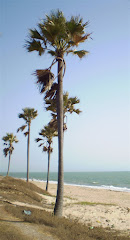So… It has recently come to my attention that not all parts of Senegal are familiar with an event that in my corner of the Petite-Côte region is called a “ngel.” Essentially it seems to be a tradition of the Serere ethnicity and is basically a big community dance party where people get together who are from the same “nawlé” (age group/generation) and often everyone will all buy the same matching fabric and then get different but coordinating outfits made. There’s traditional drumming and Serere singing, and everyone gathers in a big circle around a public place, either standing or sitting at the edges, until the music hits an irresistible pitch and you just have to run into the center of the spotlight, dance with all your might for a few crazy seconds, then run back to your seat. This continues as the music goes on, different people getting up at will, sometimes many at a time, women facing off against each other as they flail their skirts and shake their butts, eyes wild, sand flying, and the drums and electrified guitar play the same notes over and over, urging the dancers on.
As an outsider to this community, I had passed by many a ngel, watched a few from the crowd and admired many a finely-made coordinated outfit. But never had I been a part of one until the weekend of August 15 this year, which marked the annual city-wide party here, based originally on Assumption Day, a Catholic holiday, but over time gradually becoming a shared 3-day-long festival for the whole town, Muslim and Christian alike.
A few weeks beforehand my sisters were talking about the Ndoubab ngel that was planned for the weekend, and my host mom, Rama, said I should be part of it. Even though we live in Santhie II, a neighborhood in the north of town, my family is originally from one of the older quartiers, Ndoubab, a neighborhood where I have actually done most of my work here, as it is home to the school I have had most contact with, and is part of the city’s pilot waste management project.
Really I’m not usually big on the “cultural events” here - baptisms, weddings… they mostly entail getting dressed to the nines, eating lots of greasy rice and then sitting around forever, and, as the outsider, feeling more awkward and self-conscious than I already usually do, because I’m in the middle of a huge group of people who mostly don’t know me. But every now and then I give in to be “part of my family,” and since this seemed like a big deal to Rama, I agreed to go, handing over 2000 Fcfa (about $4.00 US) for the fabric that would match my sisters’.
A week later the fabric showed up, and two weeks later I picked up my dress at the tailor’s, a perfect fit. The next day, however, as I waited while Rama and the girls got ready, I wasn’t feeling in such a party mood. A giant crowd of people? Me the only white woman there? I usually try to keep a low profile as much as possible, and avoid situations where I might be singled out just because of my looks. I worried that I would feel out of place, even though this has so often been the case during my service. I put on my low-heeled fancy sandals and sat down in the hall, wiping the sweat off my melting face and catching my breath in my snugly tailor-fit dress.
My last-minute hesitation soon changed to proud excitement, however, the moment I walked out onto the sandy street behind Rama and my sisters to the oohs and ahhs of astonished neighbors. “Téy damay and ak samay doom yepp,” Rama told them. “Today I’m going out with all my children.”
From my journal 8/20/09
“It was one of those rare moments where I felt like I was really a member of this family. But even saying that sounds empty, doesn’t express the joy that filled me as I sat in that plastic chair next to Rama, part of a long line of Ndoubab women, with familiar faces all around me and the drums pounding along with the Serere songs as dusk fell on us, reunited in that timeless space for no other reason than to rejoice in being alive, being in harmony with each other, looking beautiful because we ARE beautiful, and expressing our love for each other, neighbors and friends.
I watched women rush into the circle, fecc (dance), and run out again, time after time, men who danced in solidarity, lines of people walking in rhythm, aligning and dispersing with the music.
Djibi the [charret driver] was there, part of the organizing group, and soon after the pulse got going he jumped into the sandy circle to dance a turn in the spotlight, moving closer and closer to where I was sitting as he did, until Rama nudged me to get up and I finally slid off my heels and out of my chair to join him out there, and there in front of the crowd I shook my ass as hard as I could, without a clue as to whether it looked like a good fecc, and really without even caring, and then ran back to my seat just as fast as I had left it, my heart racing.
That’s why people do this. Now I know.
It’s exhilarating. I felt so alive.”








No comments:
Post a Comment